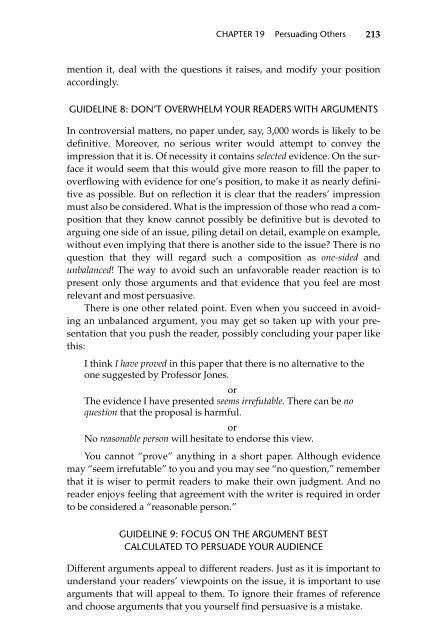Beyond Feelings
Beyond Feelings
Beyond Feelings
Create successful ePaper yourself
Turn your PDF publications into a flip-book with our unique Google optimized e-Paper software.
CHAPTER 19 Persuading Others<br />
213<br />
mention it, deal with the questions it raises, and modify your position<br />
accordingly.<br />
GUIDELINE 8: DON’T OVERWHELM YOUR READERS WITH ARGUMENTS<br />
In controversial matters, no paper under, say, 3,000 words is likely to be<br />
definitive. Moreover, no serious writer would attempt to convey the<br />
impression that it is. Of necessity it contains selected evidence. On the surface<br />
it would seem that this would give more reason to fill the paper to<br />
overflowing with evidence for one’s position, to make it as nearly definitive<br />
as possible. But on reflection it is clear that the readers’ impression<br />
must also be considered. What is the impression of those who read a composition<br />
that they know cannot possibly be definitive but is devoted to<br />
arguing one side of an issue, piling detail on detail, example on example,<br />
without even implying that there is another side to the issue? There is no<br />
question that they will regard such a composition as one-sided and<br />
unbalanced! The way to avoid such an unfavorable reader reaction is to<br />
present only those arguments and that evidence that you feel are most<br />
relevant and most persuasive.<br />
There is one other related point. Even when you succeed in avoiding<br />
an unbalanced argument, you may get so taken up with your presentation<br />
that you push the reader, possibly concluding your paper like<br />
this:<br />
I think I have proved in this paper that there is no alternative to the<br />
one suggested by Professor Jones.<br />
or<br />
The evidence I have presented seems irrefutable. There can be no<br />
question that the proposal is harmful.<br />
or<br />
No reasonable person will hesitate to endorse this view.<br />
You cannot “prove” anything in a short paper. Although evidence<br />
may “seem irrefutable” to you and you may see “no question,” remember<br />
that it is wiser to permit readers to make their own judgment. And no<br />
reader enjoys feeling that agreement with the writer is required in order<br />
to be considered a “reasonable person.”<br />
GUIDELINE 9: FOCUS ON THE ARGUMENT BEST<br />
CALCULATED TO PERSUADE YOUR AUDIENCE<br />
Different arguments appeal to different readers. Just as it is important to<br />
understand your readers’ viewpoints on the issue, it is important to use<br />
arguments that will appeal to them. To ignore their frames of reference<br />
and choose arguments that you yourself find persuasive is a mistake.


